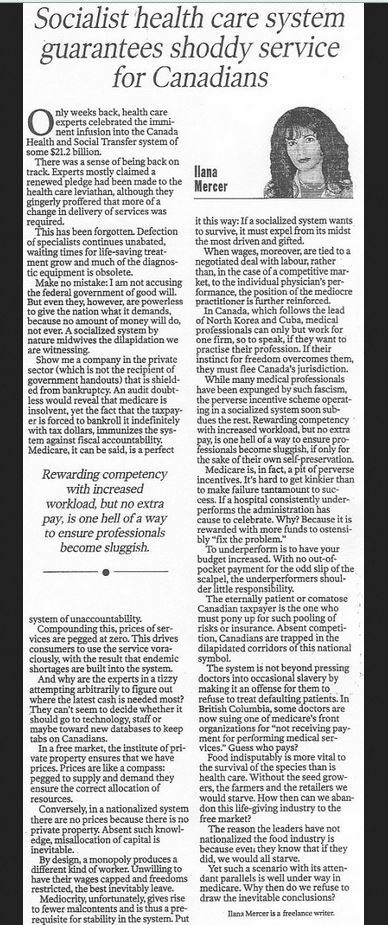As The Christian Science Monitor noted recently with bemusement, the debate about health care in Canada is “…the public debate which hasn’t happened.” The Monitor was referring to the visceral railing against Premier Ralph Klein’s emasculated Health Care Protection Act.
The sophistication of health care heckling in general has not risen much above the mob’s hackles. The crowd shrieks “gimme” at the provincial leadership, which in turn demands the same from the federal government. From Halifax to Vancouver, mobs convene to shake fists at government or at rival interests, all lining up to clamor for booty for their clans. Canada is overrun by primeval hordes. Discourse about health care is just one casualty of a polity lacking in reason and gripped by grotesque histrionics.
Alberta’s Bill 11, the object of the spleen, has come to naught. Private clinics will perform minor procedures with overnight stays. But these hapless hybrids, funded by Medicare and controlled by regional health authorities, will now have to contend with so many retrograde provisions as to render them at least as inefficient as the public system. They are certainly of little threat to the public sector unions, a number of which have helped underwrite the campaign launched by Friends of Medicare.
Unionized public sector employees garner on average 25 percent more in wages than their unionized counterparts in the private sector. This exacerbates staff shortages in hospitals because there aren’t the funds to hire sufficient personnel. Labour demands are also the reason why “among 29 OECD member states, Canada now ranks consistently ahead of only Mexico, Poland and Turkey in terms of technology available.”
According to William McArthur, the former chief coroner of British Columbia, for every million Canadians there are eight CT scanners, against 80 in Japan, 27 in the US and 17 in Portugal. All a mere trifling when you consider the values for which the Kiefer Sutherland-endorsed system stands. These include a plan to extort from cancer patients a Medicare-indemnifying waiver, where the patient acknowledges the danger of being forced to wait indefinitely for cancer treatment. These very values prohibit Canadians from purchasing private health care in Canada. Their tax dollars, however, are seized to purchase private cancer treatment on their behalf in the US. The only other nations to hold such values dear are Cuba and North Korea, so how possibly can we go wrong?
More important than the cost effectiveness of the for-profit hospital, a result confirmed broadly by four dozen or so academic studies, is the fact they are shaped by the consumer. Profit, however, is as much a part of a public hospital as it is a private one, notes Fraser Institute researcher John R. Graham. The incentives in the former, however, come in the shape of relaxed personal policies, less supervision, and salary increases divorced from performance, all of which are bad for the consumer.
Indeed, the public system engenders perverse incentives in the professionals locked into it. Because competence is rewarded with an increased workload, but no remuneration, it becomes intuitive for the professional to overstate the workload. On the positive side, the data show that the less competitive a system, the more likely it is to benefit from any competition whatsoever. Even a whiff of competition then will do our state-run sluggard good.
Only the gormless can continue to insist then that the rot is due to underfunding and not endemic to the system. With a monopoly comes an inferior product to one produced by competition, as well as a chronic scarcity in services. Although the public pays many times over for Medicare through taxes, the price of services is pegged at zero. This is what induces an insatiable consumption on the part of the public, the kind of consumption that cannot be quelled and will always yield dire shortages. Also looming is the problem of restricted access into the profession. This fuels the shortages of doctors and nurses, and is a consequence of the tight grip the medical association in cahoots with government has on licensure.
Finally, a government-run monopoly is never accountable, not least because it isn’t subject to the threat of bankruptcy. Over to top bureaucrat Sir Humphrey, star of Yes, Prime Minister: “We in the civil service don’t have profits and loses; success in the civil service is measured by the size of our staff and budget. A big department is more successful than a small one.” And a bankrupt department simply calls for more tax revenue.
©2000 by Ilana Mercer
The Calgary Herald
May 4
CATEGORIES: Canada, Free-market capitalism, Healthcare, Medicine, Socialism, Socialized Medicine, Technology

 print
print